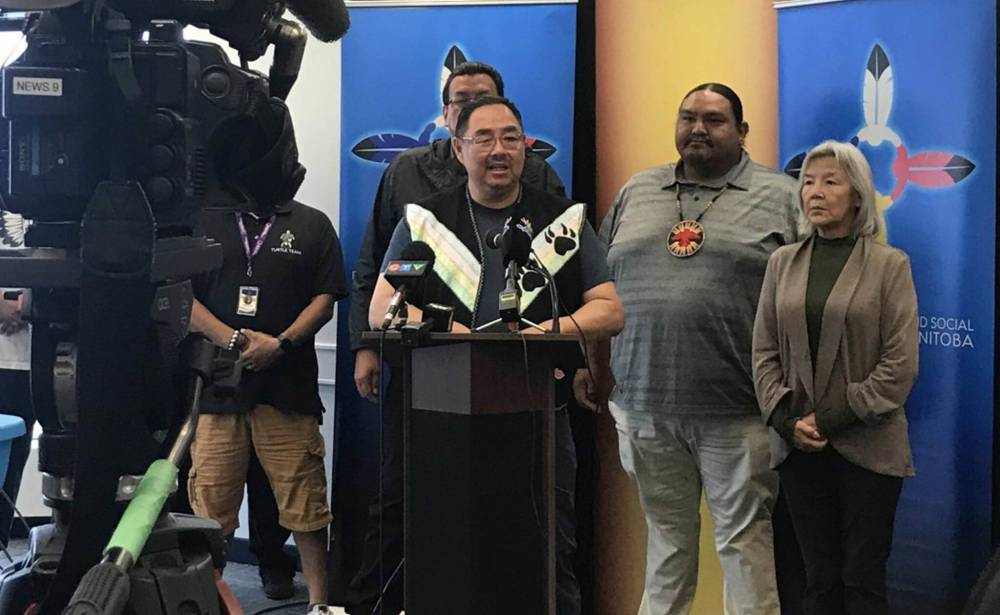Forty-two employees of a First Nations pandemic cultural support team face layoffs as a result of federal funding cuts, the Assembly of Manitoba Chiefs warned Monday, despite the team’s continuing efforts to help displaced residents.
The assembly wants the federal government to provide approximately $2.2 million to keep operating the “Turtle Team” through the First Nations Health and Social Secretariat of Manitoba.
The team has helped hundreds of people and wants to continue, said team lead Brenda Sanderson, a nurse by trade. The team provides Indigenous cultural ceremonies, including working with a sweat lodge in Point Douglas. They are there to talk to residents, help them with basic needs and try to prevent people from becoming homeless or being discharged onto the street after they arrive in Winnipeg.

KATIE MAY / FREE PRESS Black River Chief Sheldon Kent, backed by members of the Turtle Team, speaks at a news conference at AMC’s Portage Avenue office Monday.
“Whether it’s to go into the sweat, whether it’s to get a bowl of soup and a piece of bannock, whatever the case may be, they’re showing that love and helping them to look for a healthier solution,” Sanderson said.
“We want to make a difference and we have made a difference,” she added. “And we worked to support the evacuees from fire and flood out of the monies that were given to us for COVID support, so we stretched that dollar to be able to do that work.”
Piecemeal funding, including from the Manitoba government, Shared Health and federal funding through Jordan’s Principle, has been made available to keep some employees on the job through local homelessness aid programs and to focus on youth. But the whole team provides a crucial service by working with First Nations residents who’ve been displaced by fires or floods, or who have to travel to Winnipeg for medical appointments, said Black River First Nation Chief Sheldon Kent, co-chair of the board for the First Nations Health and Social Secretariat of Manitoba.
“We have to lay them off because there’s no funding,” he said, calling for the federal government to renew that funding.
The assembly was informed about the funding during a June 7 meeting with federal representatives. The organization stated the federal government informed them funding for the program was meant to be temporary.
The Free Press requested confirmation and comment from Indigenous Services Canada, but did not hear back before deadline Monday.
The Turtle Team is named for Turtle Island, the Indigenous term for North America. It was formed in January 2021 to help First Nations residents who came to Winnipeg so they could be in isolation while recovering from COVID-19 and be closer to health-care services. Initially working with people in “alternative isolation accommodations,” the team has expanded to working with the homeless population and helping people who have been evacuated because of floods and wildfires.
The team tries to ease the “culture shock” of First Nations residents who have no choice but to come to the city.
“The reason why this is important is because these issues are going to continue,” said Derek Nepinak, co-chair of the secretariat board and chief of Minegoziibe Anishinabe (Pine Creek) First Nation.
“They’re going to accelerate in an era of climate change. We’re talking about flooding, we’re talking about future forest fires, we’re talking about… people having to leave their homelands to seek shelter, safe drinking water and a way to survive.”
“The federal government has shown zero — zero — ability to look into the future and see that this program is an essential service for people who are coming into this urban environment,” Nepinak added.
Grand Chief Cathy Merrick called it an essential service and a necessary step toward reconciliation and systemic change.
“There are so many of our people that are homeless here in the city because they get caught in between systems and it’s our people that leave First Nations that come here for medical,” she said.
katie.may@freepress.mb.ca

Our newsroom depends on a growing audience of readers to power our journalism. If you are not a paid reader, please consider becoming a subscriber.
Our newsroom depends on its audience of readers to power our journalism. Thank you for your support.